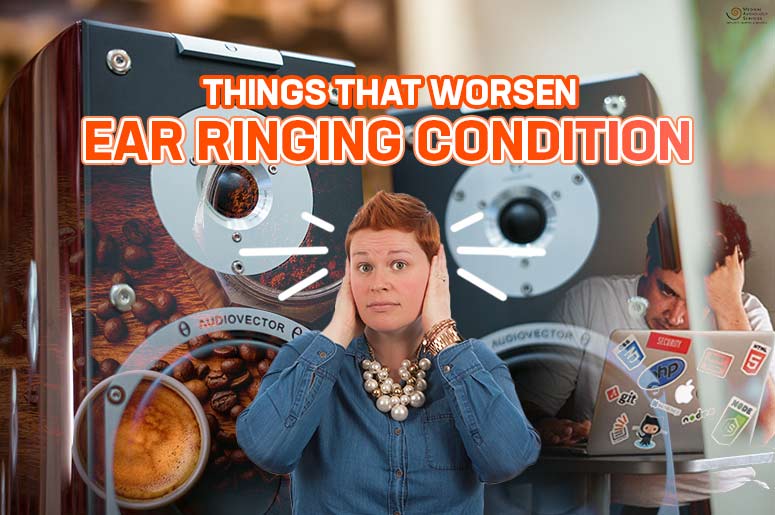What Makes My Ear Ringing Worse?
Tinnitus is the perception of sound that is not present in the environment. For many people, this is a ringing type of sound. Tinnitus is not a diagnosis or disease in itself, but a symptom. Generally, the cause of tinnitus is some kind of damage to the hearing organs. Usually, this is noise or age-related damage, which is often associated with hearing loss too.
While a huge proportion of people will experience tinnitus at some point, and many people hear tinnitus constantly, only a small percentage of people experience some kind of distress due to tinnitus. For these people, tinnitus can be very frustrating and distracting. It can even be linked to anxiety, depression, insomnia and other mental health issues. When tinnitus has such a profound impact on one’s life, it is natural to seek out the things that could be making it worse. Below is a list of things that can have an impact on tinnitus. Each of these may not apply to each individual and reducing or eliminating them may not make the tinnitus go away. If your tinnitus is causing you distress, it is best to consult a professional audiologist for a tinnitus management plan. If your tinnitus was sudden onset or only in one ear, it is crucial to consult a doctor or audiologist.
Related article: Common Tinnitus Triggers
Things that Worsen Ear Ringing Condition
1. Noise Exposure
Noise damage is one of the main causes of ear ringing conditions and further noise exposure without protection can worsen the condition. To prevent further damage it is important to wear hearing protection for all work-related, home or recreational noise exposure. A good rule of thumb when in noisy situations is that if you need to raise your voice to speak to someone one metre away, you should be wearing hearing protection.
2. Stress
Ears ringing condition, or tinnitus, has a strong link to the emotional centres of our brain, called the limbic system. Part of the limbic system’s role in our brain is to detect threats to keep us safe by creating a stress response. In some people, the limbic system is triggered by tinnitus and the ear ringing is perceived as a threat. If the ear ringing truly was a threat, it would be important for the brain to closely monitor the situation. This is why it is hard for some people to ‘tune out’ or stop paying attention to the ear ringing. The brain’s stress response is doing the job it is meant to do! Unfortunately, the brain has mislabelled the ear ringing as a threat, when it is not. This close link between the body’s stress response and tinnitus means that any general, daily stress heightens the effect. When your limbic system is shifted into overdrive by daily stress, the tinnitus seems to increase in loudness. Therefore, people with intrusive tinnitus can help manage the affects of tinnitus by managing their life stress as much as possible. This may mean reducing stressful parts of life or adding in stress management tactics such as meditation or physical exercise.
3. Poor Sleep
Sleep is also inextricably linked to tinnitus, or ear ringing conditions, via the limbic system. Lack of sleep, or poor-quality sleep, increases the stress hormone cortisol in the brain. This makes you more sensitive to stressors and is likely to increase the volume of the tinnitus. Unfortunately, this is somewhat of a ‘chicken and the egg’ situation. Many people find they cannot sleep well because they are bothered by their tinnitus, as well as the tinnitus increasing due to lack of sleep. In this case, it is important to create the conditions of good sleep by practising good sleep hygiene. It may not occur right away, but together with other tactics, such as meditation, physical exercise, stress reduction and the tinnitus management plan developed with your audiologist, small improvements in sleep can help break the cycle of tinnitus distress.
4. Certain Medications
Certain medications can worsen ear ringing conditions, either by causing damage to the hearing system or just by increasing the perception of the ear ringing that already exists. Medications that can cause damage to the hearing organ (and therefore increase tinnitus) include certain antibiotics and chemotherapy medications. There are countless medications that seem to increase the loudness of tinnitus without any known ill-effects to the hearing organ. It is important to discuss these side effects with your doctor. For many people, the importance of the medications outweighs the ill effects on the ear ringing condition. However, your doctor may be able to find another medication option. If the medication cannot be changed or ceased, it becomes all the more important to reduce other contributors that are within your control, such as those mentioned in this article.
5. Caffeine and Salt
The link between caffeine and salt to ears ringing is not well understood, but some people report worsening symptoms due to these. For caffeine, it may be the disruption in sleep caused by caffeine consumption that causes. Salt may be linked indirectly by poor diet and the general ill health effects of this. However, salt is particularly important for those with Meniere’s Disease, a specific condition with ears ringing as one symptom. If you have been diagnosed with Meniere’s Disease by a medical doctor, a low salt diet may be recommended.
Would you like to let us know about your ear ringing condition?
Whatever hearing issues you have, you can let us know. We are a team of hearing professionals who can provide you with the right treatment and help that you need. Don’t hesitate to visit our website and check our articles for insights.
Related article: Tinnitus Treatment Options

